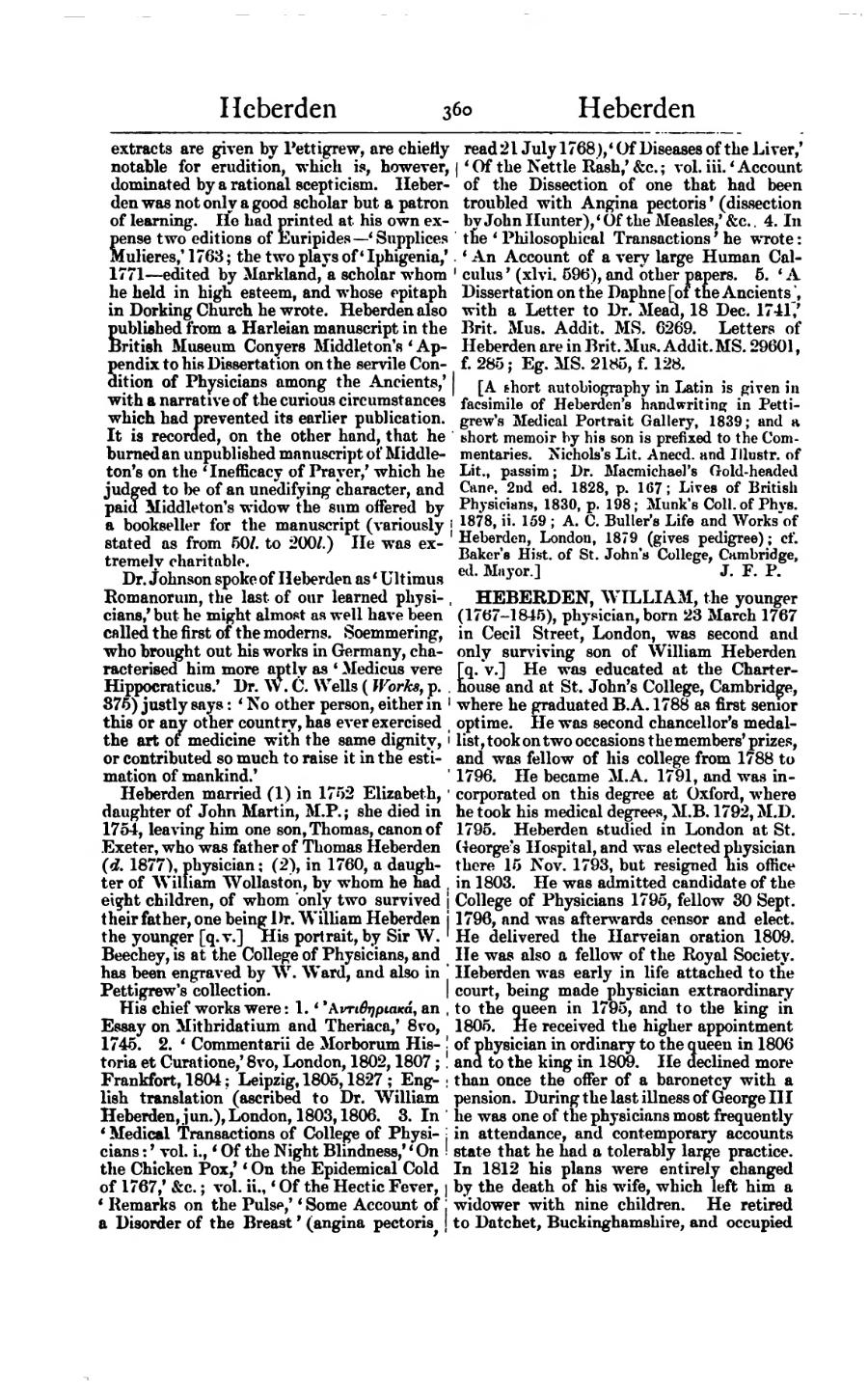extracts are given by Pettigrew, are chiefly notable for erudition, which is, however, dominated by a rational scepticism. Heberden was not only a good scholar but a patron of learning. He had printed at his own expense two editions of Euripides—‘Supplices Muheres,’ 1763; the two plays of ‘Iphigenia,’ 1771—edited by Markland, a scholar whom he held in high esteem, and whose epitaph in Dorking Church he wrote. Heberden also published from a Harleian manuscript in the British Museum Conyers Middleton's ‘Appendix to his Dissertation on the servile Condition of Physicians among the Ancients,’ with a narrative of the curious circumstances which had prevented its earlier publication. It is recorded, on the other hand, that he burned an unpublished manuscript of Middleton's on the ‘Inefficacy of Prayer,’ which he judged to be of an unedifying character, and paid Middleton's widow the sum offered by a bookseller for the manuscript (variously stated as from 50l. to 200l.) He was extremely charitable.
Dr. Johnson spoke of Heberden as ‘Ultimus Romanorum, the last of our learned physicians,’ but he might almost as well have been called the first of the moderns. Soemmering, who brought out his works in Germany, characterised him more aptly as ‘Medicus vere Hippocraticus.’ Dr. W. C. Wells (Works, p. 375) justly says: ‘No other person, either in this or any other country, has ever exercised the art of medicine with the same dignity, or contributed so much to raise it in the estimation of mankind.’
Heberden married (1) in 1752 Elizabeth, daughter of John Martin, M.P.; she died in 1754, leaving him one son, Thomas, canon of Exeter, who was father of Thomas Heberden (d. 1877), physician; (2), in 1760, a daughter of William Wollaston, by whom he had eight children, of whom only two survived their father, one being Dr. William Heberden the younger [q. v.] His portrait, by Sir W. Beechey, is at the College of Physicians, and has been engraved by W. Ward, and also in Pettigrew's collection.
His chief works were:
- ‘Ἀντιθηριακά, an Essay on Mithridatium and Theriaca,’ 8vo, 1745.
- ‘Commentarii de Morborum Historia et Curatione,’ 8vo, London, 1802, 1807; Frankfort, 1804; Leipzig, 1805, 1827; English translation (ascribed to Dr. William Heberden, jun.), London, 1803, 1806.
- In ‘Medical Transactions of College of Physicians:’ vol. i., ‘Of the Night Blindness,’ ‘On the Chicken Pox,’ ‘On the Epidemical Cold of 1767,’ &c.; vol. ii., ‘Of the Hectic Fever,’ ‘Remarks on the Pulse,’ ‘Some Account of a Disorder of the Breast’ (angina pectoris, read 21 July 1768), ‘Of Diseases of the Liver,’ ‘Of the Nettle Rash,’ &c.; vol. iii., ‘Account of the Dissection of one that had been troubled with Angina pectoris’ (dissection by John Hunter), ‘Of the Measles,’ &c.
- In the ‘Philosophical Transactions’ he wrote: ‘An Account of a very large Human Calculus’ (xlvi. 596), and other papers.
- ‘A Dissertation on the Daphne [of the Ancients], with a Letter to Dr. Mead, 18 Dec. 1741,’ Brit. Mus. Addit. MS. 6269. Letters of Heberden are in Brit. Mus. Addit. MS. 29601, f. 285; Eg. MS. 2185, f. 128.
[A short autobiography in Latin is given in facsimile of Heberden's handwriting in Pettigrew's Medical Portrait Gallery, 1839; and a short memoir by his son is prefixed to the Commentaries. Nichols's Lit. Anecd. and Illustr. of Lit., passim; Dr. Macmichael's Gold-headed Cane, 2nd ed. 1828, p. 167; Lives of British Physicians, 1830, p. 198; Munk's Coll. of Phys. 1878, ii. 159; A. C. Buller's Life and Works of Heberden, London, 1879 (gives pedigree); cf. Baker's Hist. of St. John's College, Cambridge, ed. Mayor.]
HEBERDEN, WILLIAM, the younger (1767–1845), physician, born 23 March 1767 in Cecil Street, London, was second and only surviving son of William Heberden [q. v.] He was educated at the Charterhouse and at St. John's College, Cambridge, where he graduated B.A. 1788 as first senior optime. He was second chancellor's medallist, took on two occasions the members' prizes, and was fellow of his college from 1788 to 1796. He became M.A. 1791, and was incorporated on this degree at Oxford, where he took his medical degrees, M.B. 1792, M.D. 1795. Heberden studied in London at St. George's Hospital, and was elected physician there 15 Nov. 1793, but resigned his office in 1803. He was admitted candidate of the College of Physicians 1795, fellow 30 Sept. 1796, and was afterwards censor and elect. He delivered the Harveian oration 1809. He was also a fellow of the Royal Society. Heberden was early in life attached to the court, being made physician extraordinary to the queen in 1795, and to the king in 1805. He received the higher appointment of physician in ordinary to the queen in 1806 and to the king in 1809. He declined more than once the offer of a baronetcy with a pension. During the last illness of George III he was one of the physicians most frequently in attendance, and contemporary accounts state that he had a tolerably large practice. In 1812 his plans were entirely changed by the death of his wife, which left him a widower with nine children. He retired to Datchet, Buckinghamshire, and occupied
